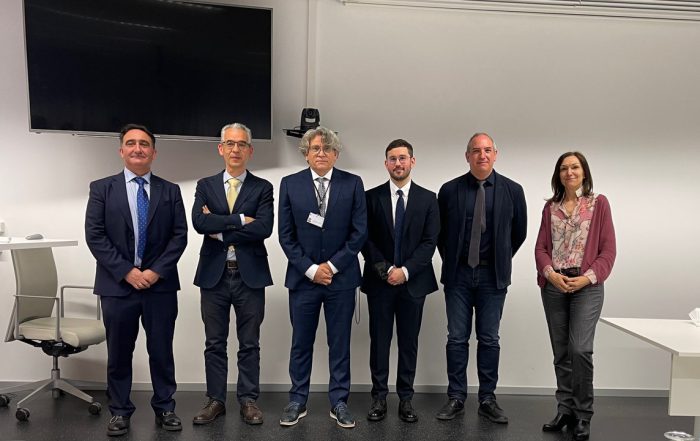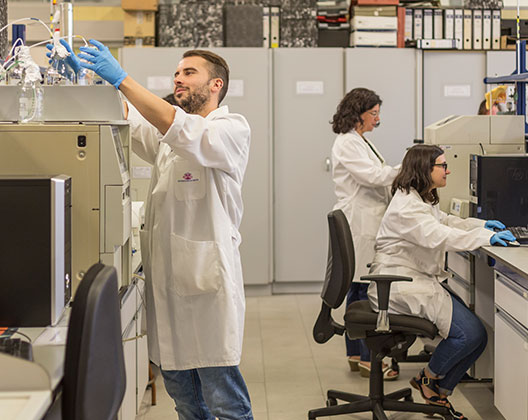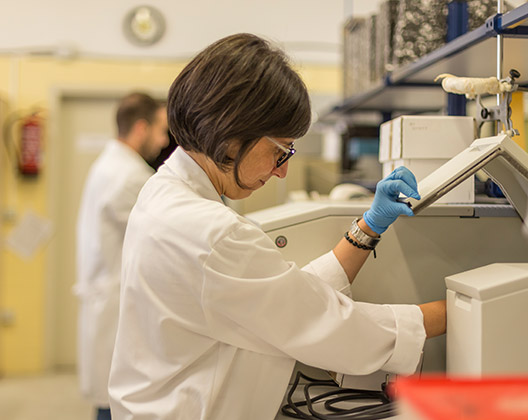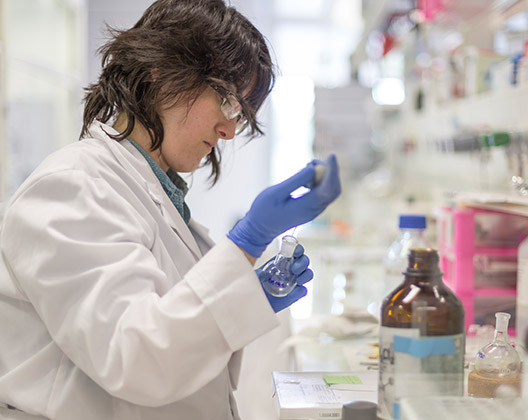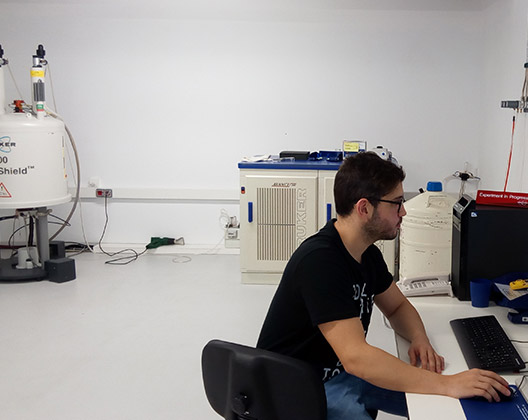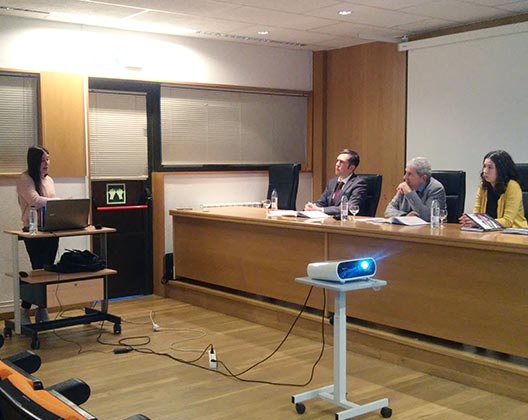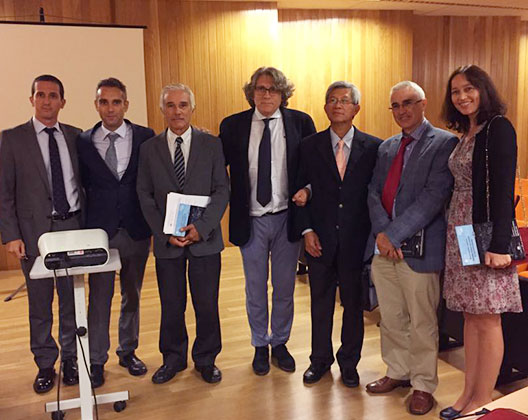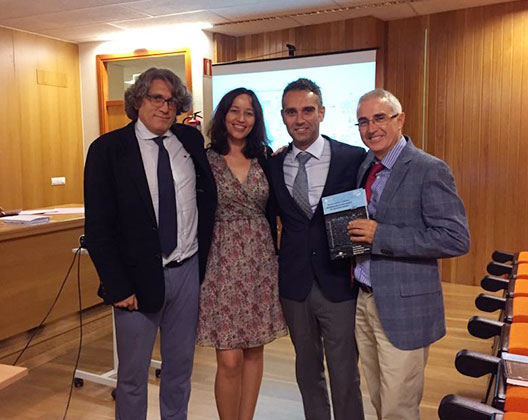PhD in Environmental and Fundamental Chemistry
PhD in Environmental and Fundamental Chemistry
The Programme
This is an interdisciplinary PhD programme in Science, focussed in Chemistry, which prepares students for research, teaching and industrial careers. In our doctoral studies, the traditional divisions of chemistry (analytical, physical, inorganic and organic), as well as chemical engineering or physics are overcome and all of them have been merged in order to provide a broad and comprehensive view of current chemistry. We offer research in: Molecular and Supramolecular Chemistry, Non-molecular Solids and Polymeric Materials, Chemical Reactivity, Environmental Chemistry and Chemical Analysis, which has main applications in basic, life, medical, materials, energy and environmental sciences.
Collaborations with international renowned groups are among the factors distinguishing this high-level programme, giving our students a chance to learn in an exciting, dynamic and international atmosphere as well as to get the PhD Degree with the “International Mention”.
Our doctoral programme also gives the opportunity to develop the so-called “Industrial Doctorate” in collaboration with different institutions, industries and companies.
Our Differential Value in the Faculty of Sciences of the University of A Coruña
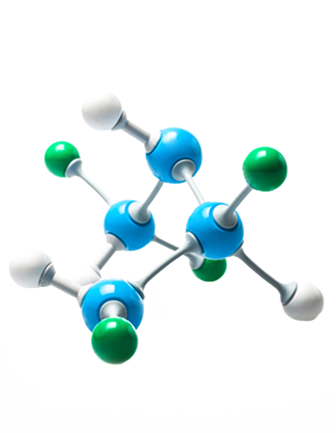
Why study this programme?
Currently, chemistry is an extremely versatile field within science and technology areas. In a complex and changing world, chemistry and the chemical sciences are essential. They are vital in our everyday lives and will be vital in helping the world respond to some of its biggest challenges, including creating solutions for a sustainable future. With a PhD in chemistry you will get so many transferable skills that may be difficult to decide which path to follow, but you will never be short of options. A PhD is required if you want to lead a research group and/or follow an academic carrier at the University. Likewise, in industries and companies related to science and technology, a PhD degree is more and more in great demand.
And also, here are five main reasons to get a PhD in Chemistry:
More career options
More affordable education
Prestige
More money
Easier to start your own company
News & Notes about this PhD
Thesis Defense
Congratulations to Ramón Eduardo Millán Álvarez who successfully defended her PhD Thesis on 22 April, being awarded with cum Laude. The committee comprised Prof.Dr. Juan R Granja [...]
Thesis Defense
Congratulations to Arturo Blanco Gómez for excellent defense of his PhD Thesis on June 22nd . It was awarded with cum Laude. The committee was comprised Prof.Dr. Nuno [...]
Technologies Used
Please visit the web of CICA and the different Research Groups sites, to see the equipment we use in the PhD. In those links you will see the detailed Equipment / Brand / Model that will be at your disposal.
Access to research groups
Doctors participating in this PhD programme belong to the following research groups:
PLACES
15 places
Offered each academic year
PUBLIC PRICE
EHEA students
200,00 €/ year
Non-EHEA students
300,00 €/ year
Academic Tutelage
+
Administrative Taxes
Career and Academic Opportunities
The chemical sector is the second largest exporter of the Spanish economy, and the leading investor in R+D+I (Research & Development & Innovation) and in environmental protection. A Ph.D in chemistry gives professional opportunities both in industry and academia.
More and more, private and public research centers, companies and industries as well as government institutions demand professionals with the higher degree. Particularly, this terminal degree offers research options, including some lab management positions not available otherwise, as well as post-doctoral positions.
Training activities
Lecture attendance
National and International Conference attendance
Attendance at specialised seminars and workshops
Attendance at information meetings on professional opportunities
Writing research papers
Oral presentations
Research stays abroad
Research Lines
The research lines respond to the Challenges posed in Horizon 2020 and the strategic goals of the Spanish State-level Scientific and Technical Innovation as well as the priority lines in Galicia’s RIS3 Programme:
- Lanthanide complexation with technological and medical applications
- Selective complexation of heavy metals
- Macrocyclic coordination chemistry
- Supramolecular chemistry and selective complexation of anions and metabolites
- Computational chemistry applied to coordination compounds
- Synthesis and reactivity of organometallic compounds
- Applications of organometallic compounds
- Self-assembly led by metal ions
- Isolation, characterization and synthesis of natural products and analogs Novel methodologies in structural characterization by NMR
- Organometallic catalysis and sustainable chemistry. Synthesis of bioactive compounds
- Stereoselective synthesis and molecular modellingBioinorganic chemistry
- Design and synthesis of Vitamin D and analogs
- In Vitro studies of cellular oxidation processes
- Theoretical characterization of reaction mechanisms
- Reactivity in ionic liquids
- Chemical kinetics: nitrosation and hydrolysis reactions; catalysis in micro-heterogeneous media; simulation of enzymatic catalysis.
- Synthesis and structural and microstructural characterization of materials including mixed oxides, inorganic-organic hybrids and nanomaterials, among others
- Study of the properties of functional and multifunctional materials
- Lignocellulosic materials
- Rheology and processing of polymeric materials
- Development of active polymers for food.
- Photochemistry of compounds with environmental interest
- Bioadsorption
- Waste water treatment by anaerobic digestion
- Development of sustainable bioprocesses for treatment of gaseous effluents and waste water
- Radioactive pollution
- Development of analytical methodologies for the determination of chemical substances in the fields of industry, the environment and the food and agriculture sector
- Chemometrics and quality assurance.
This programme has been awarded the Mention to Excellence.
The Doctoral Thesis of this programme get the majority of the special awards given by the University in the light of their excellence in the fields of Chemistry and Physics, which means a percentage of ca. 80%.
More than 60% of the Doctoral Thesis awarded the “International Mention”. This percentage increases every year.

